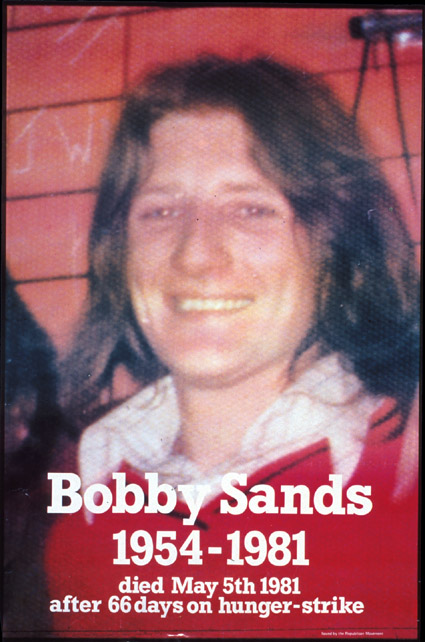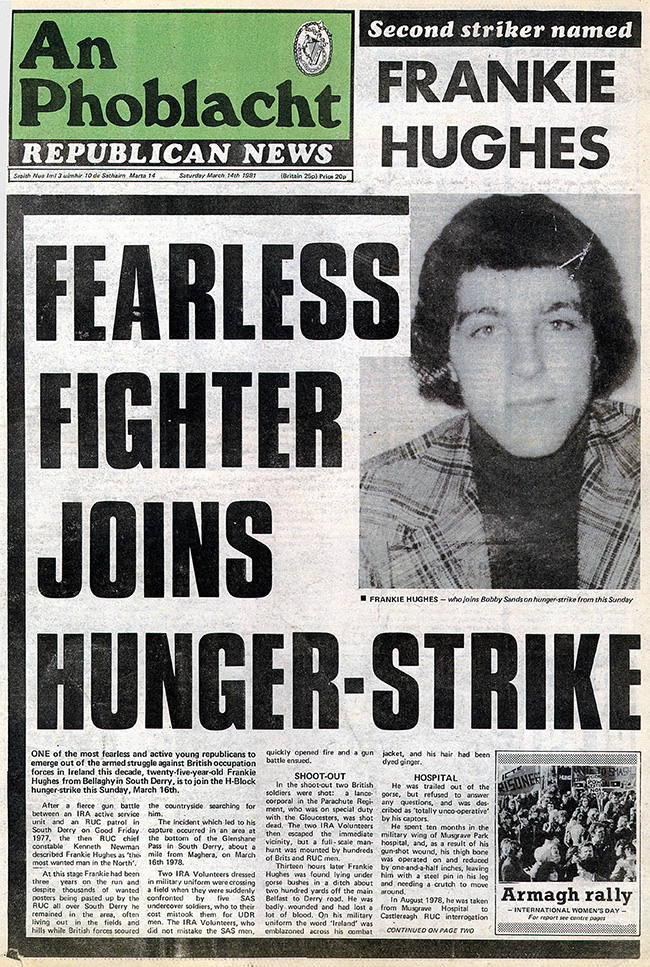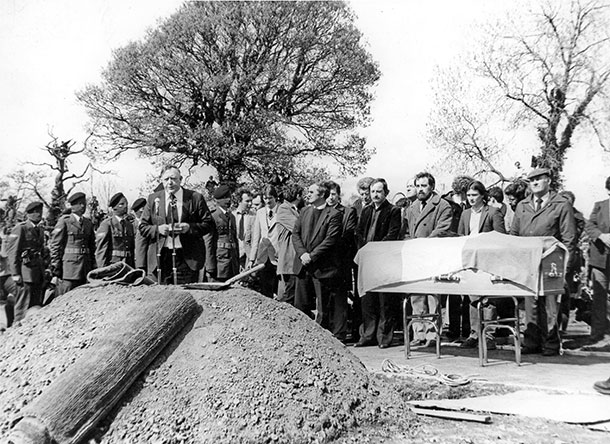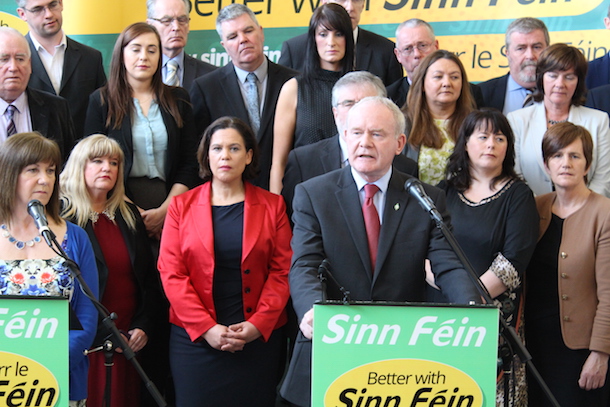24 May 2016
Assembly elections 2016 – Casement County and “The Wee Cousins”

I HAVE LOADS OF COUSINS, most of them living in Antrim. Among their number is a very special group of cousins. Their children, whom I call “the wee cousins”, take an interest in my republican activism. The wee cousins are an important reminder that future generations are central to what republicanism must be about.
The last time I stood outside Randalstown Central Primary School on an election day was 35 years ago during the 1981 Long Kesh Hunger Strike. Back then, I and others successfully elected a local Irish Independence Party member to Antrim Council on an anti-H-Block/Armagh platform.

On 5 May this year I stood for election to the Assembly in my home area of South Antrim. Standing again outside Randalstown Primary School, my thoughts raced back to 1981. Bobby Sands and the Hunger Strike were on my mind all day.
I remember sitting on top of the 'mound' in Antrim's Castle Grounds later on the afternoon that Bobby Sands died and wondering what the next few weeks and future would bring.

One week later, Francis Hughes died. His death had a massive local impact upon me and many other young people from Counties Antrim and Derry.
The direction of our lives was already being shaped from early years due to the political situation but everything changed even more dramatically in 1981.
The RUC hijacked Francis Hughes's funeral cortege in Belfast as McCusker Bros undertakers set out to bring his remains home to Bellaghy.
The RUC plan included a diversion of the cortege through Randalstown to cross the Bann at Portglenone instead of at Toome.
When we learned of this, two or three dozen local activists mounted a dignified vigil outside Lynch's Bar in Randalstown. Up the street, the RUC allowed a mob of unionists to attack the hearse.
Two days later in 1981, we and tens of thousands of others filled the lanes and crossed the fields and farmyards of Tamlaghtduff and surrounding countryside to pay final respects at Francis Hughes's funeral.

● The funeral of Francis Hughes, John Davey chairing
One week after election day in 2016, on 12 May, I registered as an MLA at the Assembly and attended its first sitting.
I travelled to Belfast that day thinking about Francis Hughes, James Connolly and Seán Mac Diarmada. 12 May marked the 35th anniversary of Francis's death on hunger strike, and the centenary of Connolly and Mac Diarmada's executions in Kilmainham Gaol.
James Connolly and Seán Mac Diarmada each had particular connections to Antrim as trade union and Irish Republican Brotherhood organisers respectively. They – along with Roger Casement – have always inspired me.
County Antrim has proud links to Easter Week 1916, represented by Charlie Monahan, Jack White, the Corr sisters, Winifred Carney and many others.
This year's Southern general and Northern Assembly elections were contested by Sinn Féin against the backdrop of the 1916 centenary and 35th anniversary of the Hunger Strikes.
I was very conscious of that when I made my acceptance speech at the South Antrim declaration on 6 May.
I said then that I had been elected “standing on the shoulders of giants” – the giants of republicanism are also in our present, as well as our past.
Mitchel McLaughlin, who has held the Assembly seat for Sinn Féin in South Antrim and is also a former national Party Chairperson, is one such giant. He is a magnificent ambassador for the Peace Process.
The Peace Process remains the most important political project in present-day Ireland.
The last six years are a dangerous reminder of what can happen when it is taken for granted, particularly by the British and Irish governments.
Partition is the key contradiction and fault line which sits at the heart of politics on the island. That's why entrenching the integrity of the Good Friday Agreement framework and principles (and their expression in power-sharing and partnership) are so essential to the political process in the North.
The Peace Process isn't finished business. Future political progress depends on embedding the principles of the Good Friday Agreement in all aspect of politics, society and community in the North.
When the SDLP walked into Opposition last week, that party walked away from its responsibilities to the Good Friday Agreement – and it did so for totally wrongheaded, selfish and opportunist reasons.
The SDLP failed their mandate and misled the electorate with a promise to deliver while preparing to walk out of the Executive.
Equality and Irish unity cannot be delivered on the Opposition benches. Tory Party austerity cannot be thwarted in an opposition coalition with the sister party of the Tories.
The political institutions in the North need to be developed as a bulwark against British Tory austerity.
No contribution to ensuring that will be made by carping or criticising from a place called 'opposition' in the Assembly.
Not for the first time has the SDLP politically and strategically miscalculated. Politics in the Six Counties will not be 'normalised' with the creation of an 'Opposition'.
The Good Friday Agreement and the institutions came about because politics in the North was never normal.
The question arises of how the role of the SDLP and others in 'Opposition' will contribute to political stability within the institutions and promote respect, deal with the past and build reconciliation.
My election acceptance speech addressed Sinn Féin's mandate for opposing austerity, growing the regional economy and promoting the equality agenda, respect and parity of esteem.
When I referred to the reaffirmation of Sinn Féin's mandate for continuing to democratically persuade for an agreed, united Ireland, some unionists from the DUP heckled and booed.
In recent days, comments about ministerial portfolios and the Irish language have been made by senior DUP figures which have raised questions about that party's intentions and its commitment to power sharing and partnership in this new term of the Assembly.
The big questions facing all parties now is whether the context created by the Fresh Start Agreement will be embraced as a 'new start' in the North. That is the real challenge.
Sinn Féin fought the Assembly election on a positive and progressive platform. This agenda now needs to be taken forward in the Northern and all-Ireland political institutions on the basis of genuine commitment to power sharing and mutual respect.
Positive, progressive and transformational politics and economic and social delivery must now have primacy.
As for the wee cousins, they haven't got the detail of all this worked out yet but they deserve a better, brighter future than the past many of us have collectively experienced.
I'm looking forward to making an important contribution to that work within the Assembly and proud to be doing so as a representative of Casement County, standing on the shoulders of giants.
Follow us on Facebook
An Phoblacht on Twitter
Uncomfortable Conversations

An initiative for dialogue
for reconciliation
— — — — — — —
Contributions from key figures in the churches, academia and wider civic society as well as senior republican figures






